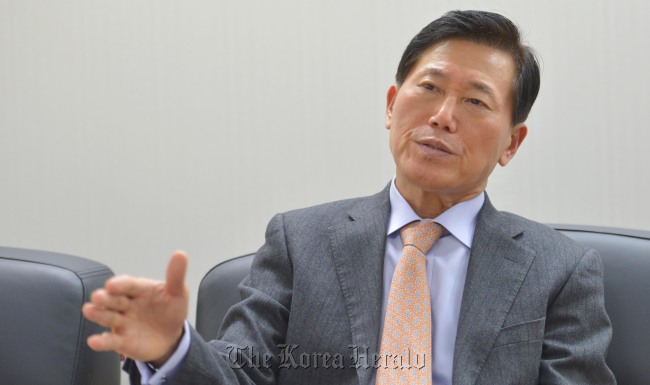Relations between Korea and the Arab world are too heavily skewed toward economic cooperation and it’s time now to create the right balance by taking them to the next level, according to a top Middle East expert.
“If the two partners are to maintain and develop their intimate economic ties, they must first learn to truly understand the other,” Chung Yong-chil, secretary-general of the Korea-Arab Society, told The Korea Herald in an interview.
The nonprofit organization was established in 2008 under the sponsorship of the Ministry of Foreign Affairs and Trade, aiming to promote communication between Korea and the 22 Arab states.
The group’s board of directors includes Foreign Minister Kim Sung-hwan, Arab state ambassadors in Korea, executives at Korean firms with an active presence in the Arab market, as well as academic experts well versed in Arab culture.
“The purpose of our organization is to boost amity, as well as to mediate between Korean firms and local Arab governments,” Chung said.
The Korea-Arab Society has sought to distinguish itself from other similar state-affiliated institutions by focusing on cultural and academic content.
“The Korea International Trade Association and the Korea Trade-Investment Promotion Agency have the lead when it comes to backing Korean firms’ export business in details,” the official said.
 |
Chung Yong-chil, secretary-general of the Korea-Arab Society (Kim Myung-sub/The Korea Herald) |
“What we do is we see the Korea-Arab relations from a wider perspective and seek to create an amicable framework, which will eventually work to the advantage of Korean companies.”
As former Korean ambassador to the United Arab Emirates and an Arab affairs expert, Chung says that the Korea-Arab connection is once again facing a watershed moment.
“Ever since I started my diplomatic career back in the 1970s, and throughout my years spent in the Middle East, the mutual relationship has seen little improvement,” he said.
Many Arabs suspect that Korean construction firms are only obsessed with natural resources and economic gains, he explained.
“We are, however, seeing the possibility of a second Middle East boom,” the former diplomat said.
For example, the construction business in Kuwait temporarily faltered after the global financial crisis in 2008 but has recently shown signs of revival, he explained.
“We thus expect a rise in the number or amount of construction orders in the Arab region this year,” Chung said.
“In order to grasp such growth potential, we are first to strengthen the trust with our Arab partners.”
For this reason, it is just as important to expand the mutual ties to the areas of politics, sports, culture and academia, he added.
“The number of Arab nationals here or Koreans interested in Arab culture is growing by the year,” he said.
“It is our belief that all these people will play their role in the Korea-Arab communication in the long-term perspective.”
One of the key programs this year is the Korea-Gulf Cooperation Council Investment Forum and Expo cohosted by KITA, which will take place in Seoul this June.
The program is to cover the top six business sectors that involve Korea firms ― clean energy, information technology, construction, agriculture, heavy machinery and transportation.
“Korea and the Arab world have a naturally complementary and cooperative relationship,” Chung said.
“Our vision is to add understanding, balance, trust to it, so that the two may continue to coexist in the future.”
By Bae Hyun-jung (
tellme@heraldcorp.com)








